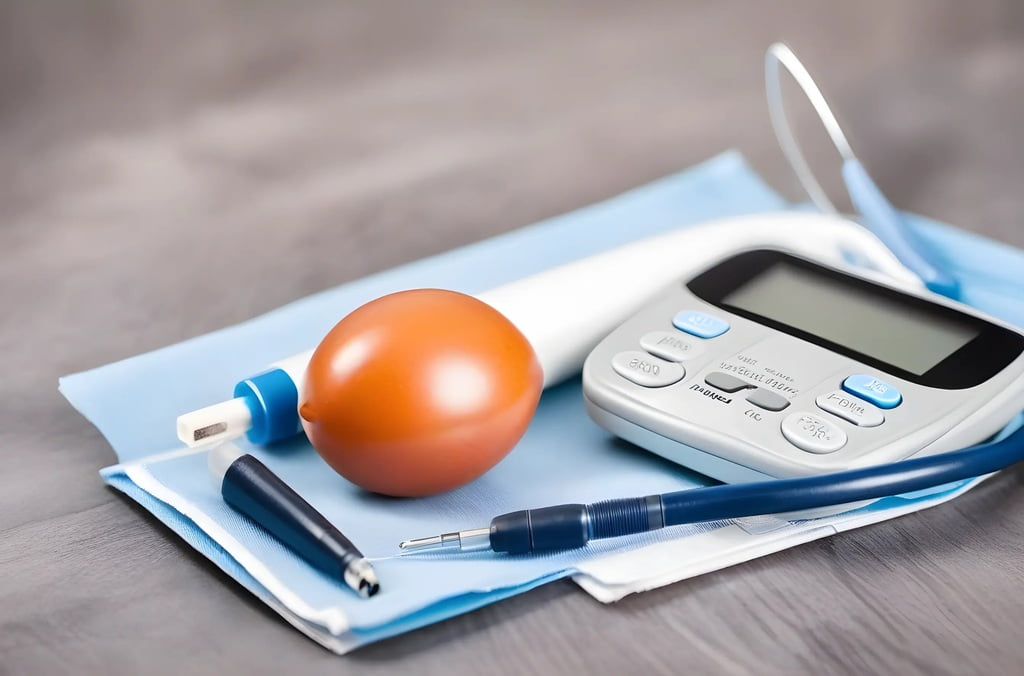Diabetes is a relatively common chronic condition that affects millions of people worldwide. Unfortunately, diabetes can have serious implications, especially when it comes to kidney health. In fact, research indicates that individuals with diabetes face a staggering 44% risk of developing kidney failure. Understanding the link between diabetes and kidney failure is essential in taking proactive steps to protect this vital organ.
What is kidney failure?
Kidney failure, also known as end-stage renal disease (ESRD), occurs when the kidneys are no longer able to function properly. This means they fail to filter waste and excess fluid from the body effectively. As a result, harmful toxins accumulate in the bloodstream, leading to various complications and potentially life-threatening situations.
The connection between diabetes and kidney failure
The relationship between diabetes and kidney failure is intricate yet well-established. Uncontrolled diabetes can damage the tiny blood vessels in the kidneys, impairing their ability to filter waste. Elevated levels of blood sugar over time can cause a condition called diabetic kidney disease, leading to kidney failure. Individuals with diabetes must be aware of this connection and take active measures to prevent kidney damage.
Impact of high blood sugar on kidneys
Chronic high blood sugar levels can wreak havoc on kidney function. The excess glucose in the bloodstream damages the delicate blood vessels in the kidneys, impacting their ability to perform their vital filtration tasks. This damage, if left unmanaged, can progress to kidney failure. By keeping blood sugar levels within the target range, individuals can significantly reduce the risk of diabetic kidney disease.
Uncontrolled blood pressure and kidney damage
High blood pressure (hypertension) is a common comorbidity of diabetes. When combined with diabetes, uncontrolled blood pressure can accelerate kidney damage. The sustained pressure can strain the blood vessels in the kidneys, leading to reduced efficiency in waste elimination. Maintaining blood pressure within the recommended range helps
protect the kidneys and reduce the risk of kidney failure.
The role of genetics in diabetic kidney disease
While lifestyle factors play a significant role in kidney health, genetics can also influence an individual’s susceptibility to diabetic kidney disease. Some people may have a genetic predisposition that increases their risk of developing kidney complications with diabetes. Understanding family medical history and discussing it with a healthcare professional can provide insight into personalized prevention strategies.
Maintaining blood sugar levels within the target range

Keeping blood sugar levels within the target range is crucial for preventing kidney damage. This involves adhering to a well-balanced diet, monitoring blood sugar regularly, taking prescribed medications as directed, and maintaining a healthy lifestyle overall. Additionally, regular consultations with healthcare professionals can help fine-tune treatment plans as required.
Controlling blood pressure effectively
Managing blood pressure effectively is paramount in protecting kidney health. This can be achieved through the use of medication, adopting a low-sodium diet, reducing stress levels, and incorporating regular physical activity. Taking proactive steps to monitor blood pressure and seeking medical guidance if needed helps mitigate the risk of kidney damage associated with high blood pressure.
Following a healthy diet plan
A healthy diet plays a crucial role in overall health, including kidney health for individuals with diabetes. Opting for low-sodium foods helps reduce fluid retention and control blood pressure. Furthermore, incorporating fruits and vegetables rich in antioxidants provides essential nutrients while limiting processed sugars and carbohydrates helps maintain blood sugar stability.
The importance of low-sodium foods
Consuming a diet rich in low-sodium foods is beneficial in managing blood pressure and preserving kidney function. It involves minimizing or avoiding processed foods, canned goods, and fast food, as they are often high in sodium content. Instead, one can focus on fresh fruits, vegetables, whole grains, and lean proteins to support kidney health.
Incorporating fruits and vegetables rich in antioxidants

Antioxidants found in fruits and vegetables help neutralize harmful free radicals in the body. These compounds can be
particularly beneficial in reducing inflammation and oxidative stress on the kidneys. Incorporating a variety of colorful fruits and vegetables into meals promotes overall health and aids in protecting the kidneys from damage.
Limiting intake of processed sugars and carbohydrates
Processed sugars and carbohydrates can lead to blood sugar spikes and overall instability. Such fluctuations can put additional strain on the kidneys and increase the risk of diabetic kidney disease. Opting for whole grains, complex carbohydrates, and natural sweeteners can help maintain stable blood sugar levels and alleviate potential kidney stress.
Engaging in regular physical activity
Regular physical activity can bring numerous benefits to individuals with diabetes, including kidney protection. Exercise helps maintain a healthy weight, improve cardiovascular fitness, regulate blood pressure, and enhance insulin sensitivity. Engaging in activities such as walking, swimming, or cycling for at least 30 minutes a day can contribute to overall well-being and promote kidney health.
Regular medical check-ups and screenings
Consistent medical check-ups and screenings play a crucial role in early detection and intervention. Regular monitoring of blood sugar, blood pressure, kidney function, and cholesterol levels allows healthcare professionals to detect any potential issues promptly. This empowers individuals to make more informed decisions about their health and take proactive measures.
Importance of prescribed medications for kidney health
Medications prescribed by healthcare professionals are essential for managing diabetes and safeguarding kidney health. Adhering to prescribed medications and following the recommended dosage is crucial to prevent the progression of kidney damage. It is important to communicate openly with healthcare professionals to address any concerns and ensure the most effective treatment plan.
Consulting a healthcare professional for tailored treatment plans

Every individual’s healthcare needs are unique, and consulting with a healthcare professional is crucial in determining tailored treatment plans. They can offer guidance on managing diabetes, controlling blood pressure, and adopting an appropriate diet and lifestyle modifications. A collaborative approach helps optimize kidney health and minimize the risk of complications.
Staying hydrated
Adequate hydration is vital for kidney health. Drinking sufficient water helps flush out waste products and toxins from the body, supporting optimal kidney function. While individual hydration needs may vary, aiming for around eight glasses of water per day is a good starting point. Staying hydrated also contributes to overall well-being and promotes a healthy urinary system.
Avoiding smoking and excessive alcohol consumption
Smoking and excessive alcohol consumption can have detrimental effects on kidney health. Smoking reduces blood flow to the kidneys, diminishing their ability to function properly. Alcohol, when consumed in excess, can strain the kidneys and contribute to dehydration. By avoiding smoking and moderating alcohol intake, individuals can protect their kidneys and reduce the risk of kidney damage.
Managing stress levels
Stress can influence overall health, including kidney function. Chronic stress can elevate blood pressure, impacting kidney health negatively. Engaging in stress-reducing activities, such as mindfulness exercises, yoga, or hobbies, can help manage stress levels effectively. Taking time to relax and engage in self-care promotes overall well-being and supports kidney health.
Connecting with support networks
Living with diabetes and the risk of kidney failure can be challenging. Building a support network of family, friends, and healthcare professionals can provide valuable emotional support and encouragement. Sharing experiences, seeking advice, and staying informed about the latest developments in diabetes management and kidney health can make the journey more manageable.
Conclusion
Protecting kidney health is of utmost importance for individuals with diabetes. Recognizing the link between diabetes and kidney failure empowers individuals to take proactive measures. By maintaining blood sugar levels within the target range, controlling blood pressure, following a healthy diet plan, engaging in regular physical activity, adhering to prescribed medications, and adopting various strategies to protect kidney health, it is possible to mitigate the risk of kidney failure. Embracing a holistic approach and staying connected to support networks ensures a comprehensive approach to managing diabetes and safeguarding kidney health.
FAQs
1. Can kidney failure be reversed if caused by diabetes?
Unfortunately, once kidney failure has occurred, it is generally not reversible. However, early detection and proactive management can significantly slow down the progression of kidney damage and improve overall quality of life.
2. How often should kidney function be monitored for individuals with diabetes?
The frequency of kidney function monitoring may vary depending on individual factors. Typically, individuals with diabetes should have their kidney function tested at least once a year. Consult with a healthcare professional for personalized recommendations.
3. Is there a specific diet that can help prevent kidney failure in diabetes patients?
Following a well-balanced diet that includes low-sodium foods, fruits, vegetables, whole grains, lean proteins, and limited processed sugars and carbohydrates is beneficial for kidney health in diabetes patients. Consulting a registered dietitian can provide personalized dietary recommendations.
4. Are there any signs or symptoms of kidney failure to be aware of?
In the early stages, kidney failure may not exhibit noticeable symptoms. However, as the condition progresses, individuals may experience symptoms such as swelling in the legs, ankles, or feet, fatigue, difficulty concentrating, decreased appetite, and changes in urine output. It is important to consult a healthcare professional if such symptoms arise.
5. Can exercise have a negative impact on kidney health for individuals with diabetes?
Regular exercise is generally beneficial for kidney health in individuals with diabetes. However, it is important to consult a healthcare professional before starting any exercise program, especially for those with pre-existing kidney complications or other health concerns.



